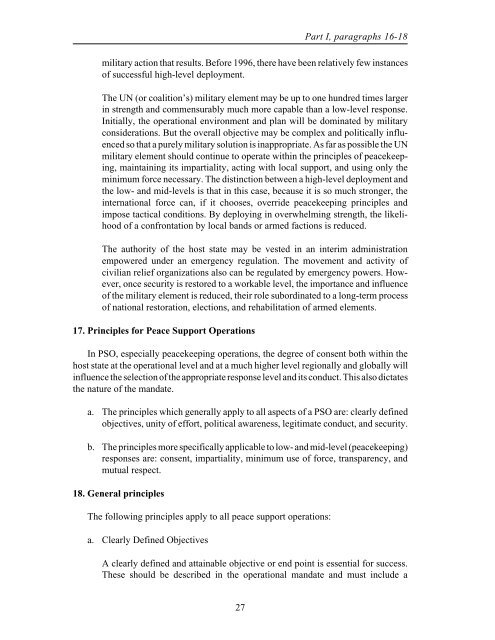a guide to peace support operations - The Watson Institute for ...
a guide to peace support operations - The Watson Institute for ...
a guide to peace support operations - The Watson Institute for ...
Create successful ePaper yourself
Turn your PDF publications into a flip-book with our unique Google optimized e-Paper software.
military action that results. Be<strong>for</strong>e 1996, there have been relatively few instances<br />
of successful high-level deployment.<br />
<strong>The</strong> UN (or coalition’s) military element may be up <strong>to</strong> one hundred times larger<br />
in strength and commensurably much more capable than a low-level response.<br />
Initially, the operational environment and plan will be dominated by military<br />
considerations. But the overall objective may be complex and politically influenced<br />
so that a purely military solution is inappropriate. As far as possible the UN<br />
military element should continue <strong>to</strong> operate within the principles of <strong>peace</strong>keeping,<br />
maintaining its impartiality, acting with local <strong>support</strong>, and using only the<br />
minimum <strong>for</strong>ce necessary. <strong>The</strong> distinction between a high-level deployment and<br />
the low- and mid-levels is that in this case, because it is so much stronger, the<br />
international <strong>for</strong>ce can, if it chooses, override <strong>peace</strong>keeping principles and<br />
impose tactical conditions. By deploying in overwhelming strength, the likelihood<br />
of a confrontation by local bands or armed factions is reduced.<br />
<strong>The</strong> authority of the host state may be vested in an interim administration<br />
empowered under an emergency regulation. <strong>The</strong> movement and activity of<br />
civilian relief organizations also can be regulated by emergency powers. However,<br />
once security is res<strong>to</strong>red <strong>to</strong> a workable level, the importance and influence<br />
of the military element is reduced, their role subordinated <strong>to</strong> a long-term process<br />
of national res<strong>to</strong>ration, elections, and rehabilitation of armed elements.<br />
17. Principles <strong>for</strong> Peace Support Operations<br />
In PSO, especially <strong>peace</strong>keeping <strong>operations</strong>, the degree of consent both within the<br />
host state at the operational level and at a much higher level regionally and globally will<br />
influence the selection of the appropriate response level and its conduct. This also dictates<br />
the nature of the mandate.<br />
a. <strong>The</strong> principles which generally apply <strong>to</strong> all aspects of a PSO are: clearly defined<br />
objectives, unity of ef<strong>for</strong>t, political awareness, legitimate conduct, and security.<br />
b. <strong>The</strong> principles more specifically applicable <strong>to</strong> low- and mid-level (<strong>peace</strong>keeping)<br />
responses are: consent, impartiality, minimum use of <strong>for</strong>ce, transparency, and<br />
mutual respect.<br />
18. General principles<br />
<strong>The</strong> following principles apply <strong>to</strong> all <strong>peace</strong> <strong>support</strong> <strong>operations</strong>:<br />
a. Clearly Defined Objectives<br />
Part I, paragraphs 16-18<br />
A clearly defined and attainable objective or end point is essential <strong>for</strong> success.<br />
<strong>The</strong>se should be described in the operational mandate and must include a<br />
27

















